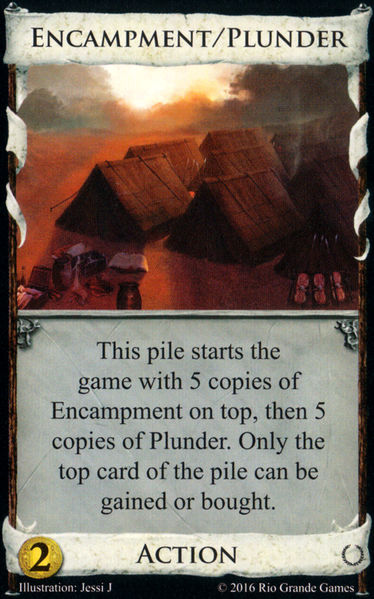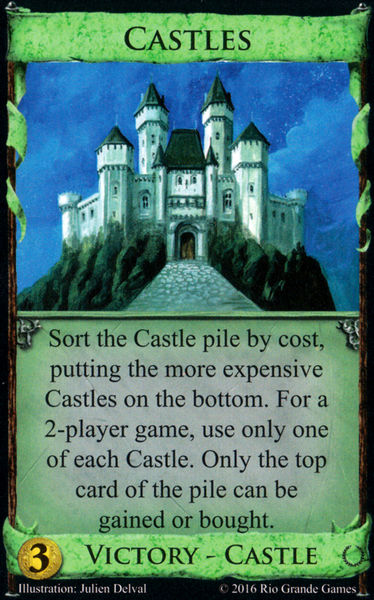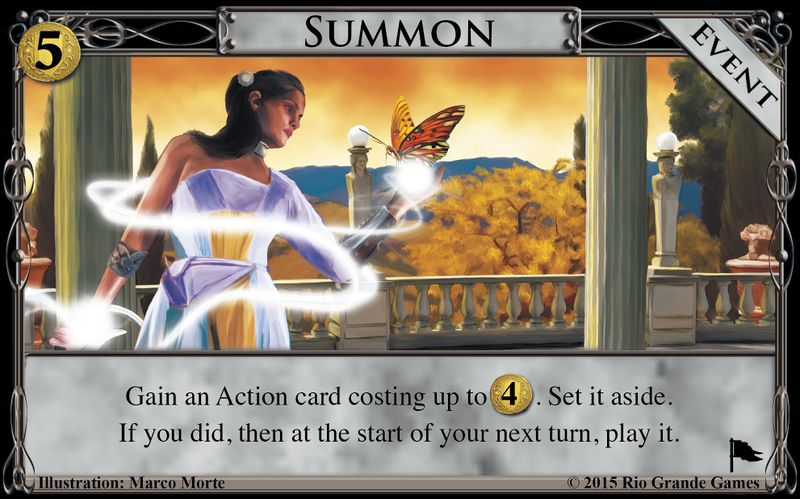EDIT: with the September 2019 errata, many of these edge-cases are no longer relevant. See the update post later in the thread.Sometimes, Dominion rules can get complicated. Most of the time, they don't matter. In a few scenarios, they matter a lot. Those scenarios are overwhelmingly "gotcha" scenarios: they make sense when you think about them, you always remember them after the first time, but they can be hard to notice on the fly.
I think people shouldn't be unreasonably rewarded for knowing more rules minutiae than the other person, so here are some edge cases. This list certainly isn't complete, but I believe most things off the list are too close to rules trivia - interesting to think about, but not powerful enough to keep in mind. (Several things in this list are already near or past that threshold.)
These are ordered roughly by relevance.
Fundamental Rules PrinciplesWhen you play a card, you do exactly what it says, in order. If you can't do something, you do as much as you can. This happens even if the card leaves play for some reason.
If multiple effects trigger at the same time, you choose what order they resolve in. Sometimes the order matter. For the online client in particular, be careful you do things in the right order. For example, if you play Alchemists + Herbalist, you should topdeck all your Alchemists before using Herbalist to put the Potion back.
When buying a card, first you trigger all on-buy events, then you gain the card, then you trigger all on-gain events.
Card CostsDominion cards have 3 axes of cost: coins, Potion, and debt. A card costs more than another one if it is greater than or equal on all those axes. So for example, $4P > $3P > $3, and 8 debt > 4 debt, What about $3P vs $4? You can't compare them, neither costs more than the other.
This lets you do several neat things, like
* Remodel Familiar into Golem.
* With Haggler in play, buy City Quarter and gain Engineer off Haggler.
* Play Stonemason, trashing University to gain 2 Vineyards.
If you play Salvager and trash a Familiar, you get +$3, not +$3P, because Salvager specifically says "+$1 per $1 it costs" - it ignores the Potion and debt axes.
Stonemason OverpayIf an action costs $0 (because of Bridge or Highway, for example), you cannot overpay by $0 to gain two copies of that action. You also cannot overpay by debt to gain two copies of an Action that costs debt. You are, however, allowed to overpay by Potion, so with $5P you can buy Stonemason and gain 2 Alchemists.
Prince + DurationsPrince does not work with Durations. When you play the Duration, it stays in play past the end of the turn. Because you didn't discard it the turn you played it, it doesn't go back to the Prince when it finishes resolving.
There is an exception. If you Prince a Gear, and don't set aside any cards with Gear, the Gear won't stay in play and will successfully get Princed next turn. But normally, you should assume it won't work, and Prince something else instead.
Procession + Reserve cardsIf you Procession a Reserve card, the Reserve card goes to the Tavern mat. Procession loses track of the Reserve card, so it can't trash it. However, you still get to gain an Action costing $1 more. This also applies to Island.
Band of Misfits / Overlord + Reserve cardsIf you play Band of Misfits or Overlord as a Reserve card, you're going to have a bad time. Both cards say "This is that card until it leaves play." Moving to the Tavern mat counts as leaving play. Once it's on the mat, the card doesn't remember what it used to be, so you can't call it and it'll be stuck on the mat forever. Just don't do it.
EventsBuying an event doesn't count as buying a card. Some side effects of this:
1. You can turn Hermits into Madmen while spending your Buys on events.
2. You can buy events on Mission turns.
3. Haggler, Goons, and Swamp Hag will not trigger on buying an event.
Buying an event doesn't count as buying a card, which can make it easier to gain Madmen.
Hermit + SchemeIf you don't buy a card and topdeck Hermit with your Scheme, you can gain a Madman without trashing the Hermit. From the wiki:
In this scenario, two things happen simultaneously, and you get to choose the order :
(Hermit) Trash the Hermit and gain a Madman.
(Scheme) Hermit goes on top of your deck.
If you resolve (1) then (2), you gain a Madman, the Hermit goes to the Trash, and then (2) doesn't do anything because Scheme lost track of the Hermit.
If you resolve (2) then (1), you put the Hermit on top of your deck, then Hermit attempts to trash itself but fails because it lost track of itself, then you still gain a Madman because you do as much as you can of the Hermit statement.
Capital TricksCapital gives you debt only when you discard it from play. If you can avoid discarding it from play, you don't take debt. You can topdeck it with Herbalist, or trash it with Counterfeit / Bonfire / Mint on-buy. If you Crown it, you get $12 + 2 buys and only take the 6 debt once. Of special note is the Mandarin on-gain. If you play Capital + 4 other Treasures that give at least $7, you can buy Mandarin + Province every turn until the Provinces or Mandarins run out.
Throne Room variants + DurationsThe official ruling is that if a Throne Room variant
directly applies to a Duration card, that Throne Room stays out until the Duration leaves play.
Examples:
* You play Throne Room on a Fishing Village. The Throne Room stays out until the Fishing Village gets discarded next turn.
* You play Throne Room on Throne Room, using the doubled-Throne Room to play 2 Caravans twice. The first Throne Room was applied to the 2nd Throne Room, and gets discarded at end of turn. The 2nd Throne Room was applied to both Caravans, so it stays out until next turn.
* You play Throne Room on Hireling. The Throne Room stays out for the rest of the game.
The rule works this way because for IRL play, it's easier to track which Durations are modified. In practice, if you're playing a big King's Court stack, you want to bunch all the Durations under the same King's Court if possible.
The rule gets trickier is with Procession. Because Procession trashes the discarded Duration, it always gets discarded at end of turn. But, you still get the Duration card's effect next turn.
Examples:
* You play Procession on Caravan. You trash Caravan and gain a $5 cost Action. Procession is discarded at end of turn. On your next turn, you draw 2 cards.
* You play Procession on Hireling. You trash Hireling and gain a $7 cost Action (if one exists). Procession is discarded at end of turn. For the rest of the game, you draw an extra 2 cards.
Adventures Tokens + TravellersIf you have a token on Page, only Page will get that bonus. The other Travellers in the Page line won't. Similarly for Peasant. This is because the other cards in the line are not in the Supply, and didn't come from the Page pile.
Band of Misfits / Overlord + ConspiratorWhen you play Band of Misfits as another action card, it counts as two action plays for Conspirator. The first action is the Band of Misfits, and the second is the card you copy.
Yes, this means that if all 3 are in the Kingdom, you can play Overlord as Band of Misfits as Conspirator for your first action, and the Conspirator will be activated. Let me know if this ever happens to you.
Band of Misfits / Overlord + Adventures TokensBand of Misfits gets the bonuses of both the Band of Misfits pile and the pile it's copying. This happens for the same reason as the Conspirator case.
InheritanceWhen you inherit an action, your Estates gain the types and the card text of that action, but they're still called Estate and still cost $2. This has a bunch of follow-on effects. Among them are:
* If an Adventures token is on the pile you inherit, your Estates will not gain those effects, because your Estates did not come from that pile.
* You cannot put Adventures tokens on the Estate pile, because the Estates in the supply are not actions - they aren't your Estates.
* Estate as Crossroads can never give +Actions, because Estate keeps its name. When you play an Estate, it can never be "the first time you played Crossroads this turn". For similar reasons, Estate as Treasure Map doesn't work.
Charm + KnightsIf you play Charm in gain mode, you cannot buy a Knight, then gain the Knight underneath it with Charm. The on-buy happens first, and at the time you're picking a card to gain with Charm, the top Knight hasn't been gained yet.
Split Piles + Adventures TokensThe official ruling is that if a token is on a split pile, it applies to all cards in that pile. When deciding whether you can put a token on that pile, you decide based on the card type of the randomizer. For Castles, the randomizer is a Victory card, and for everything else it's an action.


What that means in practice:
* You can place a +Card token on the Encampment/Plunder pile, even if the top card is a Plunder. Both your Encampments and Plunders will draw you one card.
* You cannot place a +Card token on the Castles pile, even if the top Castle is an Action.
The one way a token can get on the Castles pile is if the top Castle is an Action, it costs $4 or less through cost reduction, and you gain it with Seaway.
Playing Treasures During the Action PhaseSo far, you can do this with Black Market and Storyteller.
* If you play a Silver, then play a Merchant after, the Merchant will not give $1 if you play another Silver. Merchant only triggers the first time you play a Silver, and a Silver was already played.
* If you play a Crown during Black Market / Storyteller, it's played as a Throne Room because it's still the Action phase. You resolve the Crown in the middle of Black Market / Storyteller.
* If you gain a Mandarin during your Action phase, treasures played by Black Market or Storyteller go on top of your deck.
Summon + Cards that Gain Other Cards on Gain
(I learned about this interaction very recently.)
If you Summon Border Village or Death Cart, Summon won't play it next turn.
Wait, what?
Here's how Summon works, if you spell it all out.
* Gain an Action card costing up to $4.
* (The gained card goes to discard, or on top of the deck if you gain Nomad Camp.)
* (Summon looks for the card where it expects it to be, the discard or top of the deck for Nomad Camp.)
* It sets it aside, and if it did, it sets it aside next turn.
So what happens with the cards above? To quote the wiki:
Summoning a card that gains other cards when gained (such as Border Village or Death Cart) will cause the Summoned card to not be set aside, and thus not played at the start of your next turn. This is because the extra cards gained cover up the Summoned card in the discard pile (since the Summoned card is not set aside immediately), causing the Summoned card to be lost track of.
What you can do, however, is Summon a Border Village, then reveal Watchtower to topdeck the card gained from Border Village. Then Summon will successfully find the Border Village and set it aside.